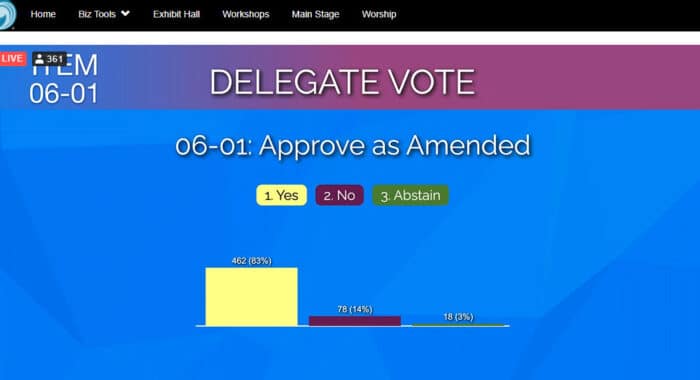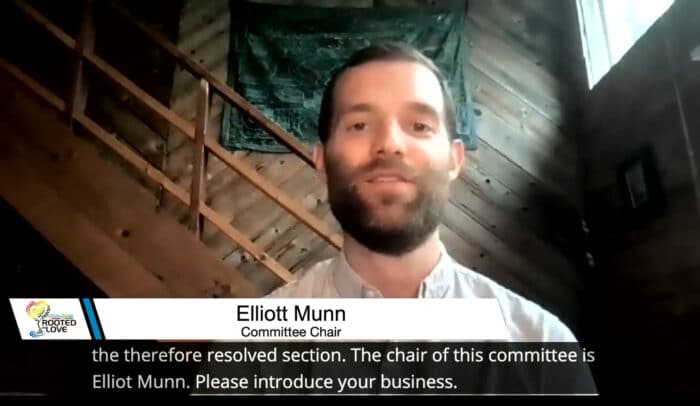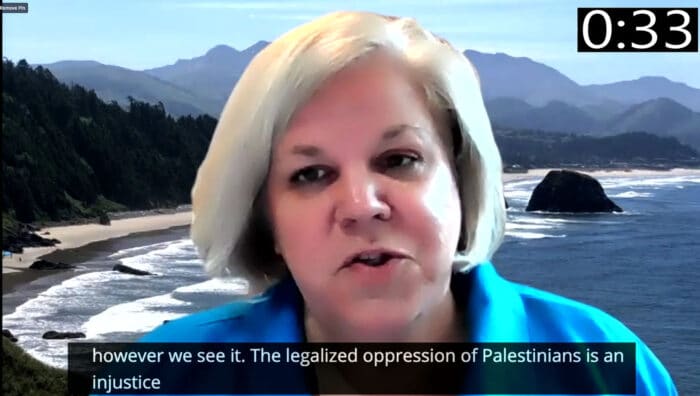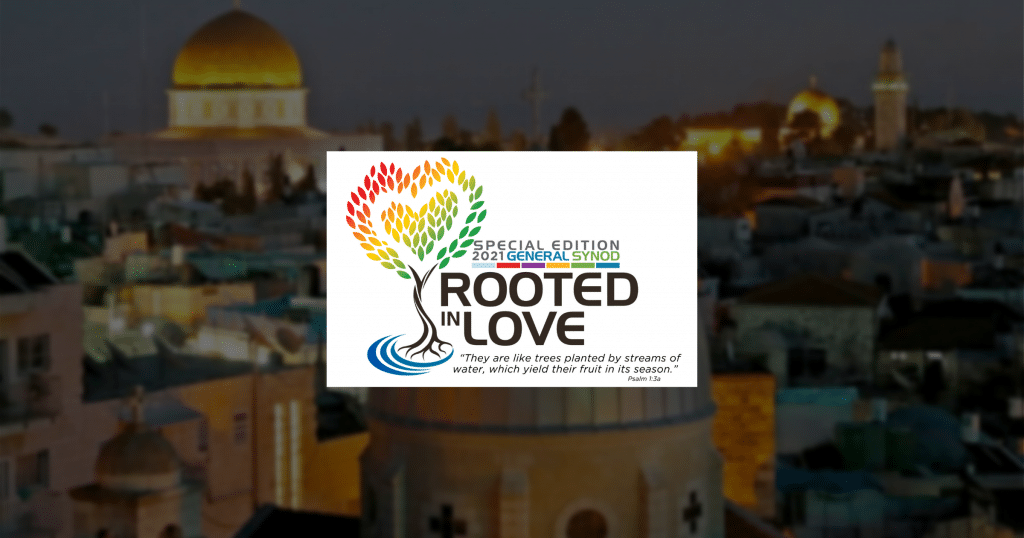Synod delegates approve resolution decrying oppression of Palestinian people
The United Church of Christ “Special Edition” General Synod on Sunday evening approved a resolution decrying oppression of Palestinian people as a matter of faith, but not before a debate over whether calling that oppression “apartheid” and naming it a “sin” was too inflammatory.

The committee that considered the resolution had recommended delegates approve an amended version that softened the tone of what had originally been presented by six churches. But delegates reversed two of three major changes the committee made before approving the resolution by a vote of 462 to 78, with 18 abstentions.
The commitee’s chair, the Rev. Elliot Munn of the Vermont Conference, said there was strong consensus in favor of the resolution, except around those particular words.
“Some folks wanted to maintain the initial language of the resolution, which offered an unambiguous prophetic vision. Others were more cautious about how particular words would affect their interfaith friends and colleagues,” he said.

The committee had “struck language identifying the oppression of Palestinians as a sin, and struck language that identified Israel as an apartheid state,” he said. The committee also changed a call to eliminate all aid from the United States to Israel, instead calling to eliminate “military aid” only, a revision that stayed in the final version.
Rev. David Grishaw-Jones of the New Hampshire Conference argued that labeling the current oppressive system of government in Israel as apartheid was critical.
“Apartheid is an internationally defined and recognized term used in legal systems and international diplomacy to name situations like the current one in Palestine and Israel,” he said. “The word is profoundly important to our covenant partners in Palestine and Israel who struggle against the yoke of occupation and oppression every day.
“It is our Palestinian partners out of their own lived experiences of dispossession and apartheid who called upon us to name what they have already experienced and continue to experience every day,” he said.
The Rev. Jeff Lukens of the Southern New England Conference served on that committee and had advocated for softening the language.
“The intention of removing the word ‘apartheid’ was to pay attention to our very real interfaith relationships we have here in the United States on the ground,” he said. “While the global impact of this resolution is very little, it might damage our interfaith relationships that we have. Toning down the inflammatory use of the word apartheid will help us to speak to the truth of what is happening and allow us to continue to be faithful in our interfaith work.”
The resolution, called “Declaration for a Just Peace between Palestine and Israel,” is written in a confessional format and was inspired by a plea from Palestinian Christians, called “Cry for Hope: A Call for Decisive Action.” It asked churches worldwide to join in declaring “that support for the oppression of the Palestinian people, whether passive or active, through silence, word or deed, is a sin.”
Some delegates balked at the word “sin” in the first “Be It Resolved” line of the document, which said “We affirm that the continued oppression of the Palestinian people remains, after more than five decades of oppression of the Palestinian people, a matter of theological urgency and represents a sin in violation of the message of the biblical prophets and the Gospel.” The committee had removed “sin in.” Delegates put it back in.
The Rev. Shari Prestemon, UCC Board member and Conference minster in Minnesota, made the motion to return the word to the statement.

“Grounding this declaration in theological terms is essential,” she said. “What we speak of is not just a geopolitical matter. We speak as church, where our sacred scriptures and theological language must always inform and shape us. The systemic oppression and denial of human and civil rights for Palestinians caused by the polices of the state of Israel violate the vision of just relationships set forth by ancient prophets and the gospels. They can rightly be described as a sin against God and God’s children.”
The Rev. Guy Johnson, a delegate from Ministers for Racial, Social and Economic Justice, asked “if this is not a sin, then what is?”
“I understand it might make some of our interfaith partners a little uncomfortable, but I believe we are called to comfort the afflicted and to afflict the comfortable,” he said. “And right now those who are in positions of power in Israel seem to be a little comfortable making sure their Palestinian siblings are kept in an apartheid state.”
The resolution explicitly rejects the idea that speaking against the Israeli government – as opposed to Jewish people – is anti-Semitic. It affirms that all people have a right to self-determination, and that “a just resolution of conflicting claims is only achieved through the equal protection of civil rights, the fair and just sharing of land and resources, and peaceful negotiation based on international law and U.N. resolutions.”
In an implementation conversation that took place on Friday, proponents of the resolution presented various steps that could be taken by individuals, congregations, associations, conferences and the national setting. They included such things as studying this resolution, recommitting to previous resolutions on the topic, supporting those in the secular world trying to speak out on the topic, and advocating for the cessation of U.S. military aid to Israel.
Tiffany Vail, director of media and communications for the Southern New England Conference, United Church of Christ, is a General Synod Newsroom volunteer.
Related News
A Prophetic Call for Justice and Peace in Palestine
The executive leaders of the United Church of Christ have issued the following statement...
Read More‘Love is Greater Than Fear’: Regional Youth Events get to the heart of gospel message
United Church of Christ teens attending this summer’s Regional Youth Events (RYE) are...
Read MoreUCC desk calendars available to order now
Prepare for your day, month and year with the United Church of Christ desk calendar —...
Read More


